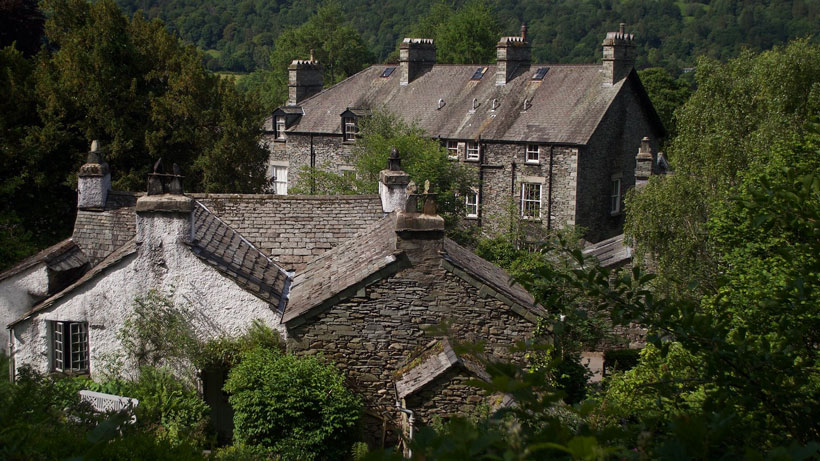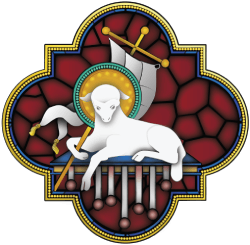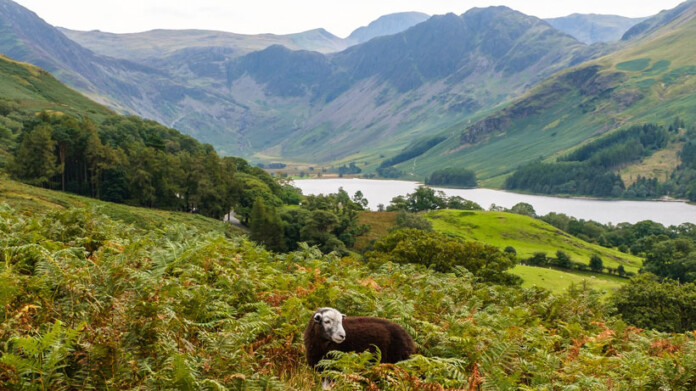By Elizabeth Orens
O Nature! Thou hast fed / My lofty speculations; and in thee, / For this uneasy heart of ours,
I find / A never-failing principle of joy, / And purest passion.
To read William Wordsworth’s The Prelude is to discover anew, in our memories and “spots of time,” the joy and reverence we have for the natural world. And yet when we forgo the meaning, the true value of our “purest passion” for nature and its gifts, especially now as we face the enormous challenge of climate change, Wordsworth summons us to recover our passion, to ponder what it reveals about our faith, our God, and our mission to protect the earth and all that dwell therein.
Even the simplest encounter with nature, Wordsworth tells us, has the power to awaken this passion. Last summer, my husband and I hiked the beautiful fells of Grasmere in the Lake District. The lush green landscape, the bubbling Rothay River, the grazing Herdwick sheep, and the sight of chaffinches, English robins, and goldcrests along the trails, inspired our every step.

Our visit to Dove Cottage, Wordsworth’s home, served as a commentary on this love of the land and its creatures. In the reception room, we were greeted by a large written quotation from his poem The Tables Turned: “Come forth into the light of things, / Let nature be your teacher.” The verse comes from one of Wordsworth’s Lyrical Ballads, in which the speaker in the poem invites his friend to put aside his books, to enter the woods, and to hearken to the songs of the linnet and the throstle.
There, in nature, his friend will find a wisdom beyond the “barren leaves” of books: “One impulse from a vernal wood / May teach you more of man, / Of moral evil and good, / Than all the sages can.” There is an inherent goodness in nature, Wordsworth claims, whose moral lessons reveal hidden depths of our human nature. When the tables are turned, not only are our senses awakened, but our hearts and minds as well. I left Dove Cottage thinking about the “light of things” — the enlightened spirit that allows us to confront the weighty concerns of climate change, forest fires, floods, oil spills, extinction of species, with courage and fortitude.
Wordsworth’s voice is only one of many calling us into “a vernal wood” to explore its deeper wisdom. Ralph Waldo Emerson, John Muir, Henry David Thoreau, John Burroughs, Rachel Carson, Aldo Leopold, Annie Dillard, Wendell Berry, and Robert Macfarlane have all made this same plea on behalf of nature and our deeper selves. “Brought into right relationship with the wilderness,” John Muir writes, a person “would see that he was not a separate entity endowed with a divine right to subdue his fellow creatures and destroy the common heritage, but rather an integral part of a harmonious whole.”
In like manner, Wendell Berry writes a half-century later: “We must abandon arrogance and stand in awe. We must recover the sense of the majesty of creation, and the ability to be worshipful in its presence.” Standing in awe of creation, seeing ourselves as part of a harmonious whole, will do more than renew our commitment to preserving it. Nature will help renew our faith.
For Christians, our awakened senses remind us that this rock, this lake, this land, this bird, this mountain, is a part of creation and the work of our God the Creator. Theologian Norman Wirzba asks us to embrace an existential logic “rooted in the assumption that the world is not an accidental or amoral realm that can be manipulated and exploited at will, but is instead divinely created, and therefore to be nurtured, cherished, and celebrated.” And we, the faithful, are commissioned to be caretakers of this sacred realm.
Wirzba’s existential logic is deeply embedded in Christian tradition. Theologians, scholars, and church leaders of all sorts have long wrestled with questions about nature, creation, and morality from a similar perspective. Among the most prominent contemporary exemplars are Rowan Williams, Pope Francis, Patriarch Bartholomew, Archdeacon John Chryssavgis, Ellen Davis, Kathryn Alexander, Thomas Berry, Denis Edwards, Jim Antal, and John Gatta. Chryssavgis speaks for them all when he writes: “Respect for the natural beauty of the world leads us to reverence before the divine beauty of God.” It is a reverence as old as Scripture itself. As St. Ephraim the Syrian observes: “Wherever you turn your eyes, there is God’s symbol. Look and see how nature and scripture are linked together.”
The opening chapter of Genesis points our eyes to this symbolic link. A loving God creates a natural world that is sacre good, harmonious, beautiful. He also creates human beings on the sixth day, the same day as he creates wild animals and the creeping, crawling creatures of the earth (Gen. 1:24-26). In this one creative act, human beings and wild animals are intimately bound together in the web of life.
And although Adam and Eve are given dominion over the fish, the birds, the cattle, and wild animals, they do so — in this often misinterpreted passage — to serve as God’s overseers and caretakers of creation. God thus directs Adam to “till and keep” Eden’s earthly garden and charges him to provide names to the animals — a caring task for establishing a deep and personal bond. And with these first acts, God blesses Adam and Eve and commissions them to care for the beauty and goodness of the earth, for “God saw everything that he had made, and indeed, it was very good.” In like manner, the land and its creatures (in their goodness) are entrusted to us today.
It is a call that extends beyond Genesis. Throughout the Pentateuch, God demands that Moses and his people take responsibility for the land (Lev. 25:1-5), care for its wildlife (Deut. 22:6), and tend to the birds in their nests (Deut. 22:30). In so doing, they honor God as sovereign landlord, for the land is ultimately his. As the Psalmist declares: “The earth is the Lord’s and all that is in it, the world and all who dwell therein” (24:1). God’s demands are ours today, writes Gregory of Nyssa: Human beings have received the breath of life for the sake of all creation “in order that the earthy might be raised up to the divine [so] that the one grace might pervade the whole of creation.” Wordsworth, good Anglican that he was, would doubtless agree.
Jesus embodies that “one grace” pervading all creation. The incarnate Son of God cherishes the sparrow, admires the lilies of the field, holds up the wonder of the mustard seed, and even calms the sea. And yet there is a more cosmic dimension to this sustaining love, for Jesus was present and coexistent with God the Father from the beginning of time: “He is the image of the invisible God, the firstborn of all creation; for in him all things were created, in heaven and on earth, visible and invisible … all things were created through him and for him” (Col. 1:15-16). The same Jesus who walked the dusty roads of Galilee, made his way through fields of grain, and spent time in the wilderness pervades the whole creation. Our reverence for this world becomes all the deeper when we grasp the full measure of Christ’s incarnational presence in all things visible and invisible, for in him lies our “never-failing principle of joy.”
And once our “purest passion” for nature is joined to our faith in God’s sovereignty and the sanctity of his creation, the call to care for God’s handiwork will be inescapable. Discerning how to respond will not be easy. Nature may be our teacher, but we must pray and brood over Scripture if we are to learn its deepest lessons. Our first steps will be simple: worship, retreats, nature walks, holy hikes, new gardens, tree planting, re-wilding, efforts to protect our parks, our wetlands, our conservancies — perhaps establishing a green rule of life.
But underlying all that we do will be a radical change of heart. As Rowan Williams reminds us: “[L]iving in a way that honors rather than threatens the planet is to convert what it means to be made in the image of God.” We begin with fundamentals: Come forth into the light of things: honor nature, honor the planet, become faithful caretakers. And in our delight in the order, harmony, and beauty of nature, we will discover God’s “purest passion” for us and for all that he has made.
The Rev. Elizabeth Orens is a priest associate at St. Paul’s K Street, Washington, D.C.




